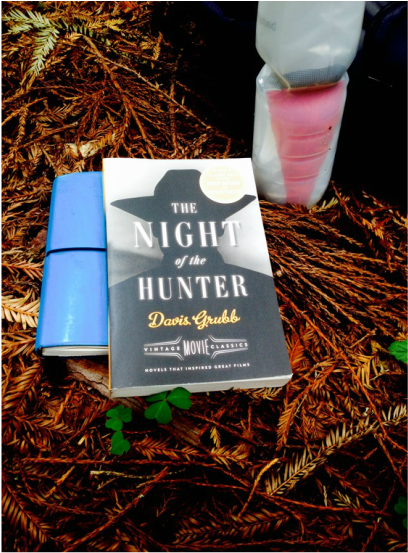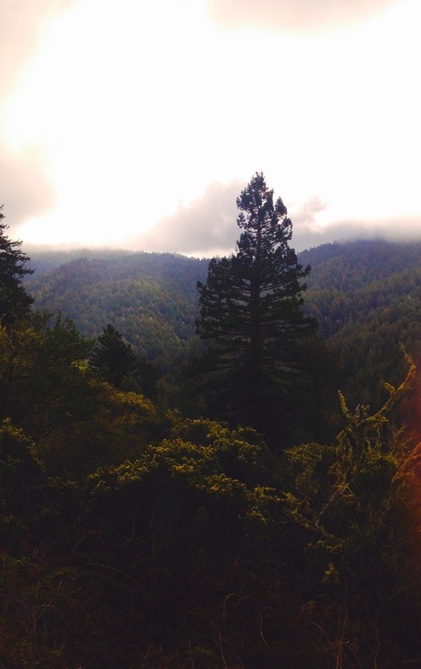"I can feel myself getting awfully mad, children."

I first saw the 1955 classic two years ago via a movie club I started at an old job. It's haunted me ever since with its masterful use of light and shadow to present a simple, yet sophisticated coming-of-age tale. The only film directed by the legendary actor Charles Laughton, The Night of the Hunter is a noir fairy tale.
I have to admit, loving the movie adaptation as much as I do, I was a bit worried that the book wouldn't hold up to the expectations I'd probably placed on it, but thankfully author Davis Grubb did not disappoint in the least bit. His command of language, his psychological portraitures of children and parents and heroes and monsters, and his explicit and secondary themes enchanted me.
Set in rural Ohio during the Great Depression, The Night of the Hunter tells the story of brother and sister John and Pearl, who at the beginning lose their father to his life of crime. But soon a shadowy figure named Preacher, a wolf posing as a shepherd, comes to the children and their mother searching for dead dad's loot: ten thousand dollars that's still missing. John, who hid the bank notes in Pearl's doll and swore to his father he'd never tell, is torn between keeping that promise and keeping his family safe.
I have to admit, loving the movie adaptation as much as I do, I was a bit worried that the book wouldn't hold up to the expectations I'd probably placed on it, but thankfully author Davis Grubb did not disappoint in the least bit. His command of language, his psychological portraitures of children and parents and heroes and monsters, and his explicit and secondary themes enchanted me.
Set in rural Ohio during the Great Depression, The Night of the Hunter tells the story of brother and sister John and Pearl, who at the beginning lose their father to his life of crime. But soon a shadowy figure named Preacher, a wolf posing as a shepherd, comes to the children and their mother searching for dead dad's loot: ten thousand dollars that's still missing. John, who hid the bank notes in Pearl's doll and swore to his father he'd never tell, is torn between keeping that promise and keeping his family safe.
"It was a secret that was a little world of its own. A terrible little world like an island whose haunted beach [John] wandered alone now, like a solitary and stricken Crusoe, while everywhere about him his eyes would find the footprint of the dangling man." {14} |
The dangling man, his father, who he witnessed being hanged by a tree at the very beginning haunts John throughout the entire story not just via the arrival of his cell mate Preacher, but via this imprisoning promise. After all, every fairy tale needs a ghost in some form or another. And a monster:
"Perhaps you better start trying to like me, smiled Preacher, ominously." {75} |
But the title, I think, with its emphasis on the night and the hunter, does the work a disservice — by focusing on the monster(s) without enough suggestion of the hero(s). This passage, among many others struck me though. It's towards the end, which becomes more thematically explicit than the nightmarish first two thirds or so. And I think it's here that Davis Grubb begins to reclaim the day from the night:
"Down in the farmhouse someone was playing a mouth harp and a girl was singing and the lamp in the kitchen window was a dusty orange glow and John yearned, for an instant, for the kindness of a room and the sound of a voice that was loving kin."I don't want to spoil too much, but what I love about this novel is what I love about the film and other certain fairy tales like Into theWoods and Pan's Labyrinth. They explore a similar theme in different ways: the virtue of disobedience. It's never formulated in The Night of the Hunter in those words, but it's there, encapsulated in the struggle of a young boy to navigate the world, but is led astray by a tyrannical father's terrible ideas. It's a shame that so many fairy tales voice the opposite, the obey-or-die mantra. It's in every culture and language and religion and time in history. | {A view of Half Moon Bay as I read the ending.} |
But unfortunately, as Davis Grubbs shows us here, parents are often times monsters, intended or not, and children, well some children, get taller, but thankfully never grow up.
They abide — not to adults — but to truth. { JG }
They abide — not to adults — but to truth. { JG }



















